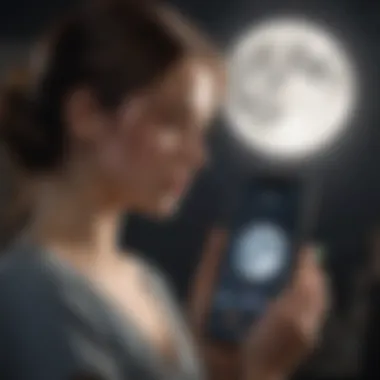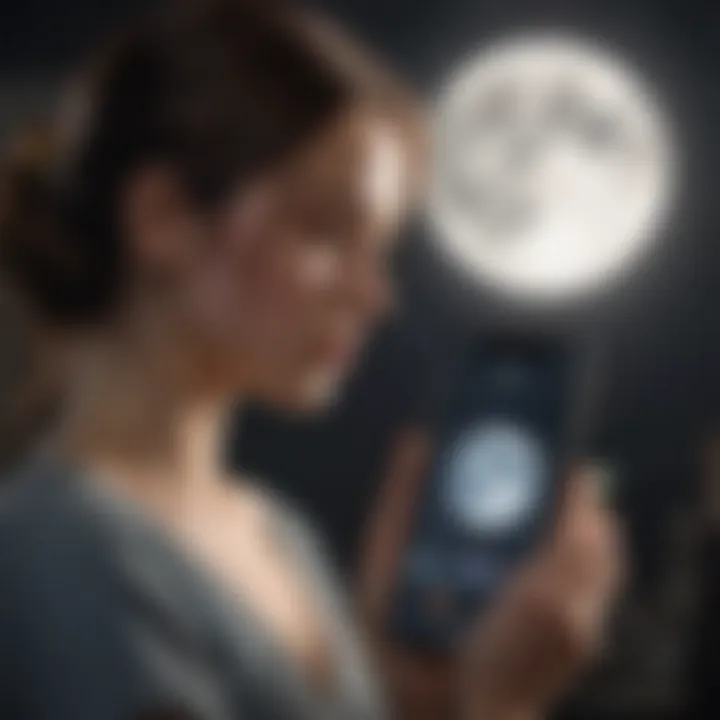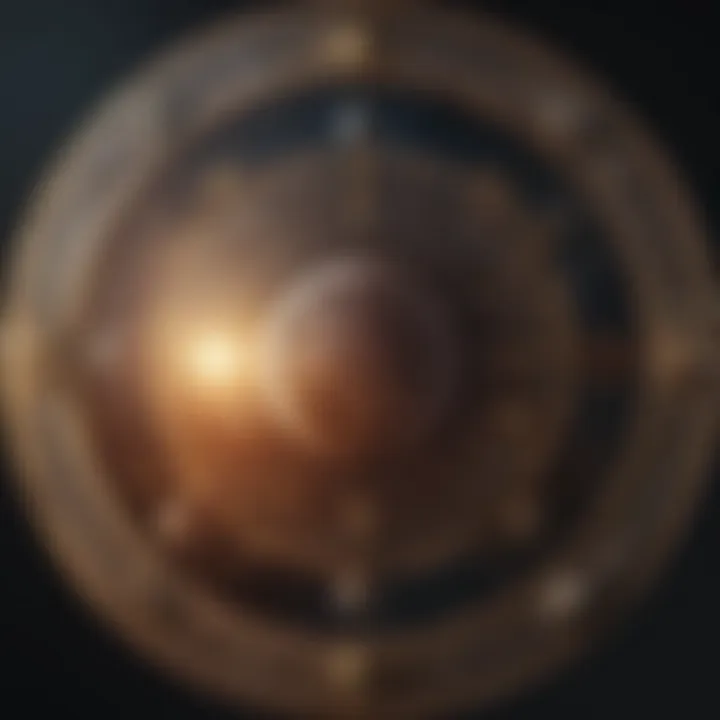The Role of Moon Apps in Astrology: Significance Unveiled


Intro
The exploration of astrology has long fascinated humanity, and its integration with modern technology marks a new chapter in this ancient discipline. As individuals seek deeper connections with the cosmos, the emergence of moon apps plays a pivotal role in enhancing astrological insights. These applications provide tools that help users comprehend lunar phases, effectively tapping into the energy that the moon offers. This guide aims to delve into the significance and functionality of moon apps in astrology, emphasizing their relevance today.
Astrological Concepts
To understand how moon apps interact with astrology, it is essential to first establish some basic astrological concepts.
Definition of Key Terms
Astrology revolves around various key terms. Natal chart, lunar phases, and horoscope are among the most crucial. A natal chart represents the sky's configuration at one's birth, while lunar phases pertain to the moon's cyclical changes. Each phase influences emotions and decision-making.
Historical Background of Astrology
Astrology has roots dating back to ancient civilizations, including the Babylonians and Greeks. It served not only informational purposes but also cultural significance. Such historical context lays the groundwork for current practices and tools now available, like moon apps, which embody this transformative journey.
Overview of Different Astrology Branches
Astrology presents various branches, including natal astrology, horary astrology, and electional astrology. Each branch focuses on specific aspects of astrological interpretation. While moon apps primarily cater to lunar and natal insights, understanding these branches enriches one's astrological knowledge and enhances the use of these technologies.
Moon Apps in Astrology
Moon apps offer a variety of functionalities that promote user engagement and related insights. They provide calendar features, personalized horoscopes, and tools to track lunar phases, making them essential for both astrology enthusiasts and casual users.
Features of Moon Apps
- Lunar Phase Tracking: Users can easily access the current lunar phase and upcoming changes.
- Personalized Insights: Many apps generate horoscopes based on the user's natal chart and current planetary movements.
- Community Engagement: Platforms often include forums for discussion, fostering a sense of community among like-minded individuals.
Benefits of Using Moon Apps
Moon apps enhance decision-making through timely insights into cosmic events. Users gain a better understanding of how lunar phases might affect their emotional states, leading to more informed choices. Additionally, with reliable notifications for lunar phases, these apps keep users connected to celestial rhythms.
"The moon has a profound effect on human behavior, and the insights provided by moon apps can transform how we navigate our daily lives."
Culmination
The integration of moon apps into astrology is a significant trend in contemporary practice. By allowing users to better understand lunar phases and receive personalized insights, these tools bridge the gap between ancient wisdom and modern technology. As the landscape of astrology adapts, moon apps stand out as invaluable resources for those seeking guidance from celestial bodies.
Preface to Moon Apps in Astrology
In today’s digital age, moon apps play a significant role in the realm of astrology. These applications have become essential tools for astrologers and enthusiasts alike, offering insights that were once accessible only through extensive study of lunar cycles. The increasing reliance on technology in astrological practices raises important considerations for users.
The importance of moon apps lies in their ability to simplify complex astrological concepts. They provide immediate access to lunar phase data, which can help users understand how the moon influences various aspects of their lives. These apps not only cater to the practical needs of users but also enhance their awareness of the lunar cycles. With a few taps on a smartphone, individuals can receive customized information that would typically require meticulous tracking.
Benefits of using moon apps are numerous. They often feature emergency notifications that alert users to upcoming lunar events, encouraging timely actions such as planting or harvesting, based on the phase of the moon. Moreover, these tools can offer personalized astrological readings that consider individual birth charts and current lunar positions. Such features help users to not just learn about astrology but also apply their knowledge in a living context.
However, alongside these advantages, considerations around the use of moon apps are necessary. Some users may become overly reliant on technology, risking the loss of traditional astrological practices. Furthermore, the accuracy of information provided by moon apps can vary, contingent on the source data or algorithms used. Therefore, astrological practitioners should blend digital tool usage with their foundational knowledge of astrology.
Overall, the integration of moon apps in astrology enhances the ability to navigate the complex interplay between celestial movements and earthly experiences. By providing a convenient means to track lunar influences, these applications have created a bridge between ancient astrological wisdom and modern technology.
Understanding the Lunar Influence
The lunar influence plays a crucial role in astrology, shaping both individual experiences and collective societal dynamics. Understanding this influence deepens one’s astrological practice, making it more meaningful and personalized. The moon symbolizes emotions, instincts, and subconscious responses. In astrology, it is associated with the inner self and emotional landscape. This makes the moon's phases vital for interpreting various life events and personal reactions.
A key benefit of understanding lunar influence lies in its capacity to enhance personal awareness. Individuals who grasp how different lunar phases affect their emotions can make more informed decisions. For instance, a new moon may signify new beginnings, inciting motivation to start fresh projects. Meanwhile, a full moon can illuminate existing issues, encouraging resolution and closure.
Another important consideration is the relationship between moon phases and astrological beliefs. The phases of the moon—from new moon to full moon and back to the new moon—can affect not only personal emotions but also broader astrological readings. By integrating this knowledge into practice, astrologers can offer their clients detailed insights that align with lunar influences. This astrological synchronization amplifies the relevance of moon apps, fostering a deeper connection to celestial cycles.


Historical Significance of the Moon
The historical significance of the moon is profound, tracing back to ancient civilizations. Cultures across the globe have revered the moon, viewing it as a powerful celestial body that governs the rhythms of nature. For instance, the ancient Romans linked their deities to the moon, attributing their agricultural cycles significantly to its phases.
Notably, Egyptians associated the moon with transformation and regeneration, believing that its cycles mirrored the life-death-rebirth process. Similarly, many indigenous tribes around the world incorporated lunar cycles into their agricultural practices, further emphasizing the moon's practical influence on human life.
The moon has always been a visible reminder of nature's cycles, guiding people in their daily lives and spiritual practices.
Understanding this historical context enriches the engagement with moon apps. These applications not only facilitate personal reflections based on contemporary insights but also draw on age-old knowledge, connecting users with a legacy of astrological wisdom.
Moon Phases and Their Astrological Implications
Moon phases play a significant role in astrological practices, each phase carrying its unique symbolism and implications. The progression from new moon to full moon, and back, represents a cycle of growth, abundance, and release.
- New Moon: This marks the beginning of the lunar cycle. It symbolizes new intentions and is the ideal time for setting goals. Practitioners often harness this energy for manifestation and planning.
- Waxing Crescent: As the moon grows, this phase signifies action and preparation. It encourages personal development and the pursuit of new opportunities.
- First Quarter: This phase is about challenges and decisions. It involves taking bold steps toward achieving set intentions.
- Waxing Gibbous: Representing refinement and adjustment, this is a time to evaluate progress, tweak plans, and ensure alignment with initial goals.
- Full Moon: This is a peak of energy. Full moons are celebrated for closure, culmination, and heightened emotions, making them perfect for reflection and gratitude.
- Waning Gibbous: Following the full moon, now is time for introspection and gratitude. This phase allows one to process experiences and recognize lessons learned.
- Last Quarter: Challenges faced during the first quarter may re-emerge, prompting further introspection and resolution efforts.
- Waning Crescent: The final phase in the lunar cycle encourages release and letting go. This time can be used for rest, recovery, and preparations for the next new moon.
Understanding these phases and their astrological implications gives users of moon apps valuable insight. It informs not just individual decisions, but also the larger themes at play in life cycles. In a world where these tools enhance astrological practice, knowledge of lunar phases bolsters user capacity to maximize the benefits of what these applications offer.
Types of Moon Apps Available
In the contemporary landscape of astrology, moon apps play a pivotal role. They provide essential tools that cater to the needs of both seasoned astrologers and curious newcomers. These applications encompass various functionalities, allowing users to track lunar phases, gain personalized insights, and integrate these celestial patterns into everyday life. Understanding the different types of moon apps available enhances the user's experience and fosters a deeper connection to astrological practices.
Lunar Calendar Apps
Lunar calendar apps are fundamental for anyone interested in tracking the moon's phases throughout the year. These applications display the cycle of the moon in a visually engaging format. Users can view the new moon, first quarter, full moon, and last quarter phases, offering insights into the lunar energy at any given time.
Benefits of Lunar Calendar Apps:
- Clarity on Lunar Cycle: Users can easily see when each lunar phase occurs, helping them align their activities with the moon's energy.
- Event Planning: Many people find it beneficial to plan important events around lunar phases, as some believe certain phases are more auspicious than others.
- Synchronization with Nature: Engaging with a lunar calendar promotes a rhythm in daily life, connecting users with natural cycles.
Astrological Moon Phase Calculators
Astrological moon phase calculators serve a more personalized function. They allow users to calculate their specific moon phase for any given date, usually by inputting their birth details. This phase is believed to significantly influence personality traits and life events.
Considerations for Using Moon Phase Calculators:
- Personal Insight: Users can reflect on their traits and potential based on the moon phase they were born under.
- Astrological Forecasting: By understanding how current lunar phases interact with their natal phase, users can make informed decisions.
- Customization: These calculators often consider additional astrological aspects, providing a tailored experience based on individual charts.
Personalized Moon Journey Trackers
Personalized moon journey trackers are a burgeoning area within the realm of moon apps. These applications help users document their experiences in relation to the moon's cycles, offering reflections and prompts for self-discovery.
Key Features of Personalized Trackers:
- Reflection Prompts: These apps might include daily or weekly questions that encourage users to reflect on their emotions and actions in relation to lunar activity.
- Mood Tracking: Users can log their moods throughout the lunar cycle, which can reveal patterns tied to moon phases.
- Community Engagement: Some trackers allow users to share their journeys or insights with a broader community, fostering connection among individuals interested in astrology.
In summary, the types of moon apps available enhance an individual's understanding and engagement with lunar astrology. Each app type offers unique features that serve different aspects of users’ lives, establishing a framework for deeper astrological exploration and personal growth.
Key Features of Effective Moon Apps
When exploring moon apps in astrology, understanding their key features becomes essential. Effective moon apps are designed to cater to the needs of users, enhancing their experience while engaging with astrological concepts. These features not only help users with convenience but also support deeper insights into lunar phases and astrological implications.
User-Friendly Interfaces
A significant aspect of any application is its interface. A user-friendly interface simplifies navigation and ensures users can access information quickly. Many popular moon apps have clear layouts. This enables users to easily switch between lunar phases, astrological predictions, and personalized settings. When an app feels intuitive, users are more likely to engage regularly. Moreover, aesthetics play a role, as visually appealing designs can enhance the overall experience. Apps that incorporate calming colors and straightforward icons can help users feel connected to the lunar theme.
Customizable Notifications
Notification features are crucial in maintaining user engagement. Moon apps with customizable notifications allow users to set alerts based on significant lunar events, such as new moons or full moons. This personalization is vital as it helps users align their activities with lunar cycles. A well-programmed notification system ensures users don’t miss important astrological opportunities. Users can tailor these alerts to their preferences, choosing what they wish to be reminded of. This level of customization adds substantial value, as it keeps individuals informed and involved in their astrological journey.


Astrological Insights and Predictions
The core purpose of moon apps revolves around providing astrological insights and predictions. Excellent apps offer detailed explanations of current celestial events and how they pertain to individual charts. Such insights can include guidance on personal intentions and actions during different moon phases. Users benefit from explanations about how lunar aspects can influence their daily lives. Further, many applications analyze user data, generating personalized forecasts based on astrological principles. Providing this level of detailed information enhances user trust and engagement, encouraging them to rely on these digital tools for their astrological needs.
In essence, effective moon apps connect users with celestial cycles, promote self-awareness, and facilitate growth in astrological understanding.
As a result, the most effective moon apps are well-designed with user interface simplicity, notification customization, and rich astrological content. This trifecta of features transforms how individuals engage with astrology and lunar cycles, making the process both accessible and meaningful. Simply put, these apps act as crucial tools for individuals seeking to enhance their connection to the cosmos.
Benefits of Using Moon Apps
Moon apps play a significant role in modern astrology. They facilitate a deeper engagement between individuals and astrological concepts. By bridging technology and spirituality, these applications offer various advantages. Not only do they provide users with direct access to lunar information, but they also help in enhancing user experiences related to personal growth and understanding.
Enhancing Personal Awareness
One of the main benefits of moon apps is the enhancement of personal awareness. These tools allow individuals to track the moon's phases and how they correlate to their personal experiences. The features available in most apps help users recognize patterns in their feelings and behaviors based on lunar cycles.
For instance, a user might notice that they feel more energized during a waxing moon and more introspective during a waning phase. This awareness can help in setting intentions or reflecting on goals.
Some moon apps, like My Moon Phase or LunarCalendar, provide customizable notifications to alert users about significant lunar events. Such features can remind users to engage in rituals or practices that align with the energy of the moon. The result is a heightened sense of self-awareness, which can lead to better emotional management.
Guided Decision Making
Another crucial benefit of moon apps is their contribution to guided decision-making. With astrological insights at their fingertips, users can leverage lunar information to make informed choices. Whether deciding on the best time to start a new project or when to take a step back, moon apps offer the necessary guidance.
For example, knowing that a new moon signifies new beginnings can encourage individuals to initiate change or projects at that time. Conversely, understanding the impact of a full moon on completion can help users finalize ongoing tasks. The apps often include astrological forecasts that relate directly to lunar phases, providing context and insights for decision-making.
According to various surveys, users often report feeling more in control of their choices when guided by lunar phases. This connection empowers people to align their actions with the natural world around them.
Connection to Nature's Cycles
Using moon apps fosters a profound connection to nature's cycles. The moon has been a symbol of femininity and intuition across cultures. By engaging with lunar cycles through these apps, individuals can cultivate a deeper respect for the natural world.
The applications not only inform users about the moon's current phase but also delve into its significance. This understanding cultivates mindfulness and encourages users to appreciate the changing cycles of nature. By seeing how the moon influences tides, agriculture, and even human behavior, individuals gain a perspective that enhances their spiritual experience.
In summary, moon apps serve as essential tools for personal awareness, informed decision-making, and reconnecting with natural rhythms. They offer a pathway to explore astrological insights and cultivate a greater understanding of how lunar influences affect our lives.
Challenges and Limitations of Moon Apps
When using moon apps, it is vital to understand both their capabilities and the challenges that accompany them. While these applications provide valuable insights into lunar cycles and astrological influences, a critical evaluation reveals that they have certain limitations. Recognizing these challenges can guide users in maximizing the benefits while maintaining a realistic perspective of what these tools can offer.
Accuracy of Predictive Features
One primary concern with moon apps is the accuracy of their predictive features. Many users rely on these applications to give them insights into future lunar phases and astrological events. However, the accuracy of the predictions can vary significantly based on the methodology used in the app's algorithms. Some apps may be based on standardized astrological calculations, while others may use more subjective interpretations. This inconsistency can lead to misunderstandings for users who take these predictions at face value. Therefore, discernment is crucial; users should not solely depend on these predictions for making significant life decisions. Cross-referencing with established astrological texts or consulting experienced astrologers can provide a more holistic understanding.
Over-Reliance on Digital Tools
Another challenge is the potential for users to become overly reliant on digital tools at the expense of personal intuition and traditional practices. With the convenience offered by moon apps, there is a risk that individuals may neglect their personal connection with the lunar cycles and the broader astrological system. This dependency can diminish one's ability to engage with astrology on a more intuitive level. It is important to remember that while technology can enhance understanding, it cannot replace authentic experiences. Users should strive for a balance between utilizing these digital resources and fostering their direct engagement with astrology.
"Technology should facilitate a deeper connection with astrological practices, not replace the intrinsic experiences they offer."
In summary, the challenges associated with moon apps underscore the importance of a nuanced approach. By being aware of the accuracy of predictive features and avoiding over-reliance on digital tools, users can cultivate a more informed and enriching experience in astrology.
User Demographics and Trends
The exploration of user demographics and trends is a key facet in understanding how moon apps function within the broader astrological ecosystem. Recognizing the distinct characteristics that define various user groups aids developers and researchers alike in designing applications that meet specific needs. This section delves into the rising interest in moon-related information and practices among diverse demographics, particularly focusing on Millennials and Generation Z. Additionally, it analyzes shifting cultural attitudes toward astrology and its integration into daily life.
Millennials and Gen Z Engagement
Millennials and Gen Z represent a significant portion of the current users of moon apps. Their engagement with these applications is often fueled by a desire for personal development and greater self-awareness. Members of these generations tend to seek out tools that provide insights into their personal lives, aided by technology.


Some key factors influencing this trend include:
- Digital Native Habits: Growing up with technology, these users are comfortable utilizing mobile apps for various aspects of their lives.
- Holistic Practices: There is a growing embrace of holistic and alternative healing practices. Moon apps serve as a bridge, connecting users with astrological insights that complement yoga, meditation, and self-help approaches.
- Community Engagement: Platforms such as Reddit and Facebook have fostered spaces for discussions around astrology, enhancing the collective experience of using moon apps. Users often share experiences and insights, solidifying a sense of belonging.
Given these factors, moon apps are developed with usability in mind, ensuring features resonate well with younger audiences. They blend functionality with the aesthetic appeal that is highly valued by Millennials and Gen Z.
Growing Interest in Astrological Practices
The rising interest in astrological practices serves as a backdrop for the increasing adoption of moon apps. At its core, astrology has transitioned from being a niche interest to a more mainstream phenomenon, as more individuals explore its relevance in contemporary life. Several elements contribute to this surge:
- Cultural Shifts: Younger individuals are drawn to astrology as a means of understanding the complexities of life. Personal challenges and societal uncertainties have encouraged many to consider astrology for guidance.
- Access to Information: The internet has made information about astrology easily accessible. This ease of access invites exploration, leading to a greater understanding of astrological principles.
- Integration of Technology: As technology evolves, so does the way astrology is practiced. Applications effectively cater to individual needs by offering personalized insights based on astrological data.
Integrating Moon Apps into Daily Life
In today’s fast-paced world, integrating moon apps into daily life offers a unique way to connect with the lunar cycle. These applications serve as tools for individuals to understand the moon's influence on their emotional and physical well-being. Harnessing the power of technology, users can receive insights that have historically been part of astrological practice. Hence, the significance of these applications goes beyond mere novelty—they provide a framework for self-discovery and deeper awareness of one's environment.
Practical Applications for Wellness
Moon apps can be powerful companions for wellness. They offer various features tailored to improve mental and emotional health. For instance, many of these apps provide daily reminders that align with specific lunar phases. This can help users plan important activities like starting new projects, meditating, or even decluttering their spaces. By recognizing the moon's influence, individuals can align their actions with cyclical energy, promoting harmony within their lives.
- Tracking Mood Swings: Many users report that their moods fluctuate with lunar phases. Moon apps can track these emotions, helping users understand patterns over time.
- Sleep Patterns: Some applications allow users to monitor how the lunar cycle affects their sleep quality. Insights gained can help with the development of better sleep habits.
- Holistic Practices: Integration with tools like guided meditations, yoga poses customized for moon phases, offers a mental and physical connection to wellness.
These features cultivate a holistic approach to self-care, reinforcing personal growth while also fostering a mindful connection to nature.
Supporting Spiritual Growth and Self-Reflection
The integration of moon apps supports not just wellness but also spiritual aspirations. For those on a journey of self-discovery, these tools can serve as guides that inspire deeper reflection. Many applications offer journaling features that encourage users to write about their experiences, thoughts, and feelings correlated with lunar events. This practice fosters introspection and clarity.
- Goal Setting Aligned with the Moon: Using moon phases as a guide, users can set intentions or goals. For instance, the New Moon is often seen as a time for new beginnings. By tracking these cycles, individuals can articulate their aspirations more clearly.
- Astrological Insights: Certain apps provide daily or monthly insights based on the current moon phase. This contextual information can support users in making decisions that align with their spiritual paths.
- Community Engagement: Many moon apps have forums or community sections where users can share experiences and insights. This creates a sense of belonging and shared exploration among like-minded individuals.
"Embracing the moon not only enriches personal growth but also nurtures one's spirit, guiding the user through introspective journeys."
By embedding these tools into daily practice, individuals invite lunar energy into their lives, enhancing both awareness and spiritual depth.
Future of Moon Apps in Astrology
The future of moon apps in astrology holds immense potential as technology continues to evolve. These applications are not merely tools but gateways that can deepen an individual’s understanding of lunar influences. The growing reliance on mobile technology makes it crucial for astrology enthusiasts to embrace moon apps for personalized insights. This section will discuss two essential facets that shape the future of these tools: technological innovations and the expanding community surrounding astrology.
Technological Innovations on the Horizon
Moon apps are set to become more advanced with significant technological innovations. Artificial intelligence is increasingly integrated into moon applications. This development can enhance predictive analytics and provide more accurate insights based on individual user data. Furthermore, advancements in user-interface design will likely improve navigation and accessibility.
- Augmented Reality (AR): This can offer users an immersive experience by visualizing lunar phases as they appear in real-time. Imagine pointing your device at the night sky and seeing the current moon phase overlaid with astrological interpretations.
- Wearable Technology: Integration with smartwatches may allow users to receive instant notifications of moon phase changes or personalized astrological events. This connectivity can lead to more proactive engagement with lunar influences.
- Community Features: Future apps might offer platforms for users to share experiences, insights, and astrological practices, fostering a sense of belonging.
"As technology progresses, moon apps will not only function as personal guides but also engage users in broader astrological conversations."
Expanding the Astrological Community
The ascent of moon apps contributes to the growth of a more diverse astrological community. This expansion is fueled by the accessibility these applications provide. Various age groups are discovering astrology through their smartphones, making it a topic of interest for many.
- Millennials and Gen Z: These demographic groups are increasingly engaging with astrology, using moon apps to understand their personal signs better and apply lunar knowledge to daily life.
- Inclusivity in Practices: With more resources available through moon apps, various astrological practices are becoming more inclusive, inviting individuals from different backgrounds to explore astrology on their terms.
- Global Connections: As users from around the globe share their experiences within apps, cross-cultural astrological discussions emerge, enriching the overall community.
The potential ascendance of moon apps is not just about technology. It represents a paradigm shift in how astrology is perceived and practiced, paving the way for a new era of exploration and understanding. This future hinges on fostering connections through both innovative tools and shared practices.
Epilogue
In the context of this article, the conclusion serves as a vital summation of the essential themes outlined throughout. The discussion surrounding moon apps in astrology has spotlighted their unique functionality and relevance. These applications successfully bridge traditional astrological practices with modern technology, providing users the opportunity to interpret celestial influences in real-time.
One notable element is the adaptability of moon apps, which cater to a range of users from seasoned astrologers to curious novices. As technology advances, these tools increasingly integrate features that enhance understanding of lunar cycles, translating complex astrological data into accessible forms. This user-centric approach ensures personalization, allowing individuals to align their decisions and aspirations with astrological insights, enhancing personal awareness and growth.
Furthermore, the benefits of using moon apps include facilitating a deeper connection to nature's rhythms. By tracking lunar phases, users can engage more profoundly with their environments and themselves. This aspect also promotes considerations of sustainability and mindfulness in daily lives.
However, it is crucial to acknowledge the challenges presented by an over-reliance on digital tools. While moon apps offer valuable insights, they cannot replace the nuanced understanding developed through study and experience. A balanced approach, where users utilize these tools to complement their knowledge, will yield the best outcomes.
In summary, the discussion in this article underscores the significant role of moon apps in astrology. As more individuals turn to these applications, the integration of technology and astrological wisdom opens pathways for enhanced personal development and exploration. This evolution reaffirms the timeless interest in celestial guidance while adapting it to contemporary user needs. By embracing these tools, astrology enthusiasts can navigate their complexities with greater ease and insight.







